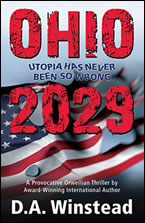March 25, 2014
Ohio 2029:
Utopia Has Never Been So Wrong
D.A. Winstead
Aviva Publishing (2014)
ISBN: 9781938686665
Dystopian Novel Shows Hateful Red State-Blue State Divide Can Be Mended
 The cover of Ohio 2029 makes two statements: that it is an “Orwellian Thriller,” and that “Utopia Has Never Been So Wrong.” Set, as Orwell’s 1984 was, in the not-too-distant future, Ohio 2029 depicts an America suffering from the results of a catastrophic economic collapse. How this situation arose is described in detail in the book, but ultimately, it resulted in the Southern Red States seizing power in the U.S. Government and setting up reform zones in the United States, largely to punish states, particularly Ohio, that have disagreed with their past policies. The overall situation is more complicated than that and shows wrongs cannot last forever, but when the novel opens, the main thing to know is it is now the year 2029 and the reform zones are being closed, save for the one in Cincinnati.
The cover of Ohio 2029 makes two statements: that it is an “Orwellian Thriller,” and that “Utopia Has Never Been So Wrong.” Set, as Orwell’s 1984 was, in the not-too-distant future, Ohio 2029 depicts an America suffering from the results of a catastrophic economic collapse. How this situation arose is described in detail in the book, but ultimately, it resulted in the Southern Red States seizing power in the U.S. Government and setting up reform zones in the United States, largely to punish states, particularly Ohio, that have disagreed with their past policies. The overall situation is more complicated than that and shows wrongs cannot last forever, but when the novel opens, the main thing to know is it is now the year 2029 and the reform zones are being closed, save for the one in Cincinnati.
Spearheading control of these reform zones is U.S. Senator from Georgia, Ted Marshall. Ted is extremely bitter about the past and what led to the demise of America’s greatness. When the collapse began, Ted and his family had been friends with the Garners, their next-door liberal neighbors in Atlanta, but the friendship quickly ended, their political ideologies separating them. The Garners soon left Atlanta and ultimately ended up in Cincinnati in the reform zone. This separation hurt members of both families, but most hurt were the Marshalls’ daughter, Mary Catherine, and the Garners’ son Maddy. Yes, Mary Catherine and Maddy are star-crossed lovers, so in love that after high school, Mary Catherine decides she will run away and go to Cincinnati to be with Maddy.
Ted is infuriated when he learns that his daughter has gone to live in a reform zone—infuriated because of the repercussions it will have on his political career. Ted thinks he has all the answers—why the United States economy collapsed, and what is required to restore his country to greatness, and who deserves to be punished for being on the wrong side of history in 2008 and 2012. But Ted is also a complex and dynamic character. I have to admit I do not usually care for politics or political novels, and at first, I was concerned this book’s agenda might be too “Republican” or “Red-State” for my taste, but readers should never make the mistake of believing that characters’ viewpoints are those of their author. D.A. Winstead, throughout the novel’s early chapters, is setting Ted up for a big awakening as he begins his journey to find his daughter.
Meanwhile, Mary Catherine is having an eye-opening experience in the Cincinnati Reform Zone, especially since she and Maddy live in an area nicknamed “Hell Town.” And there are some unsavory characters in Hell Town, including a “roamer” who has set himself up as a leader of young boys, calling himself “Teacher.” Mary Catherine soon learns that everyone in the zone fears Teacher, and for good reason. And when Teacher finds out she is the daughter of Senator Marshall, it will put into motion a chain of events that will require Ted not only to find but to save his daughter.
I really admired how Winstead balanced out the political issues in this novel, and while he begins by presenting the big picture of U.S. history and politics in the years leading up to 2029, in the end, he hones in on how politics affect real people, can tear families apart, and where the gray lines exist between Red and Blue where people can heal. Winstead has written several intriguing political novels in the past that have been set in what to many of us are exotic foreign locations, such as Sudan, South Africa, Croatia, and Latvia. His years of working in the U.S. State Department have inspired these political thrillers with historical backgrounds. Ohio 2029 is really no different for it is set in a future—and, therefore, foreign to us—United States. Winstead makes his future world both real and frightening, and he shows the riveting truth: misguided notions of what would constitute an American utopia often backfire on those unwilling to see the truth. Many readers will disagree with various points made in the novel, but in the end, I think they will appreciate the presentation of both sides and especially the themes of family and forgiveness at the center of this story.
For more information about D.A. Winstead and Ohio 2029, visit www.DAWinsteadBooks.com.
— Tyler R. Tichelaar, Ph.D. and award-winning author of Narrow Lives and The Best Place

